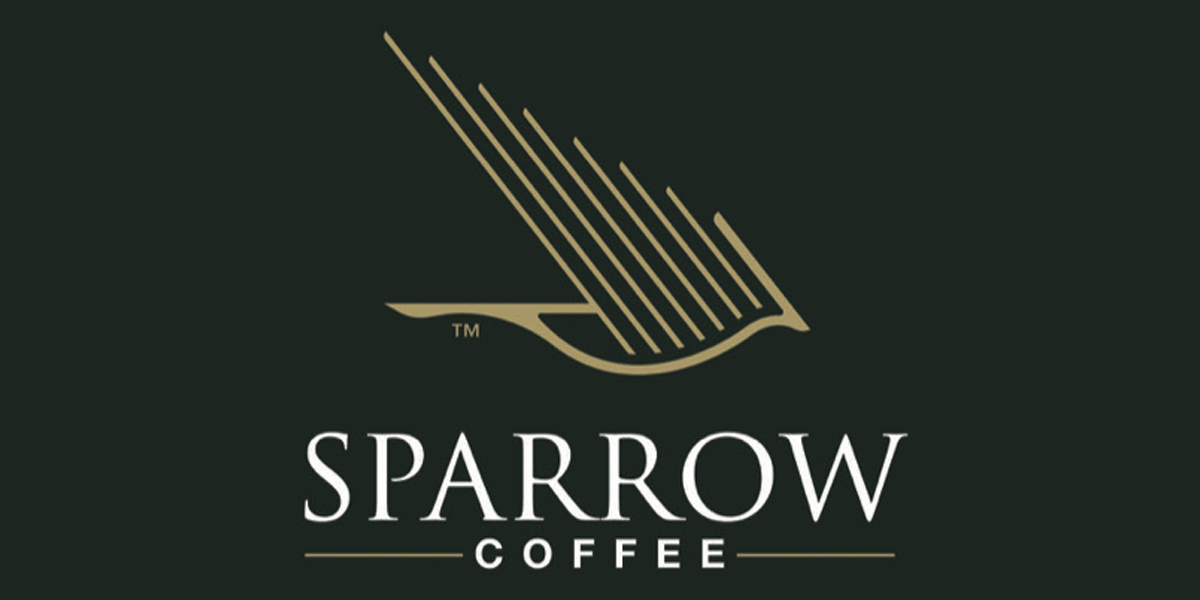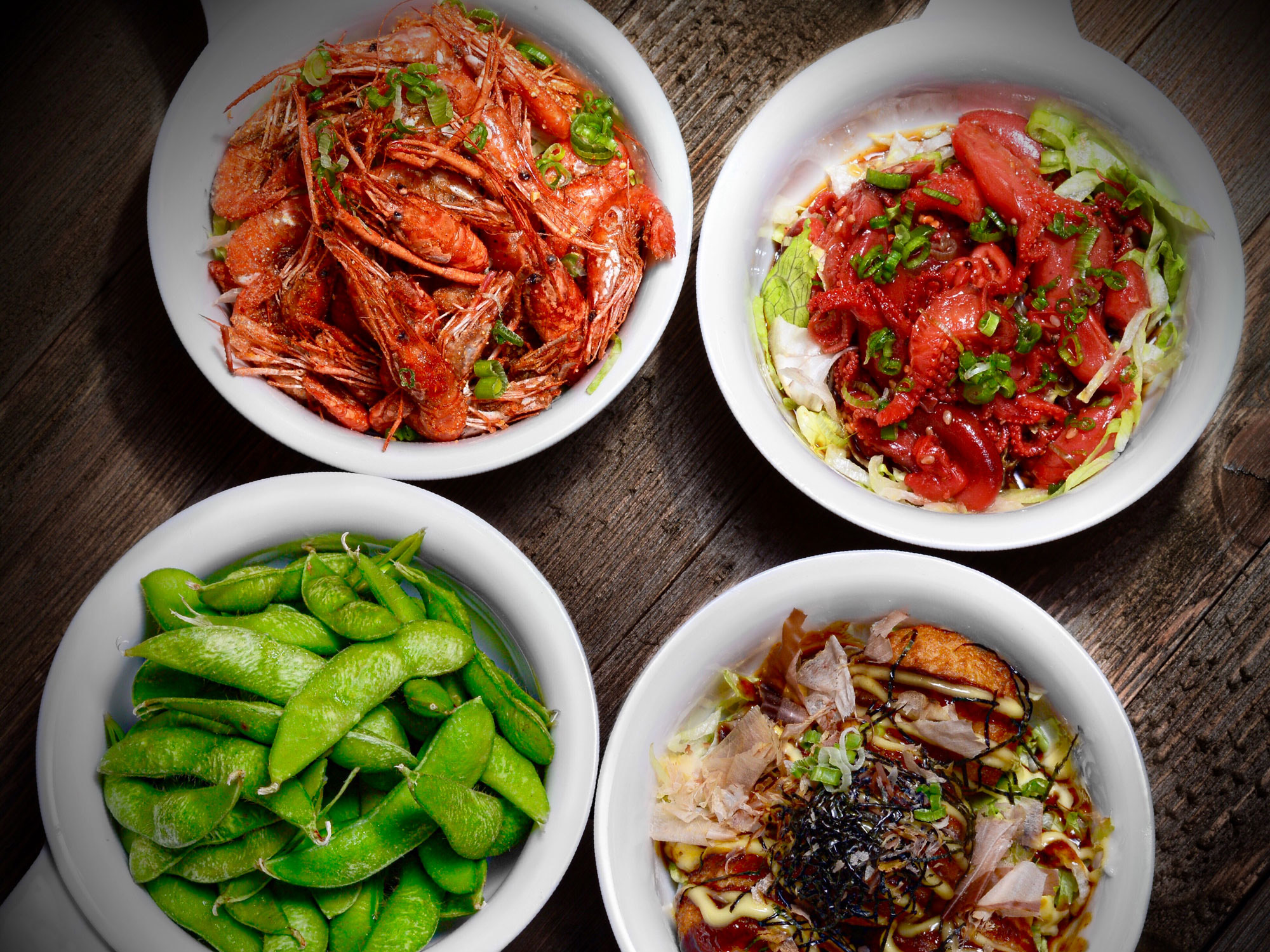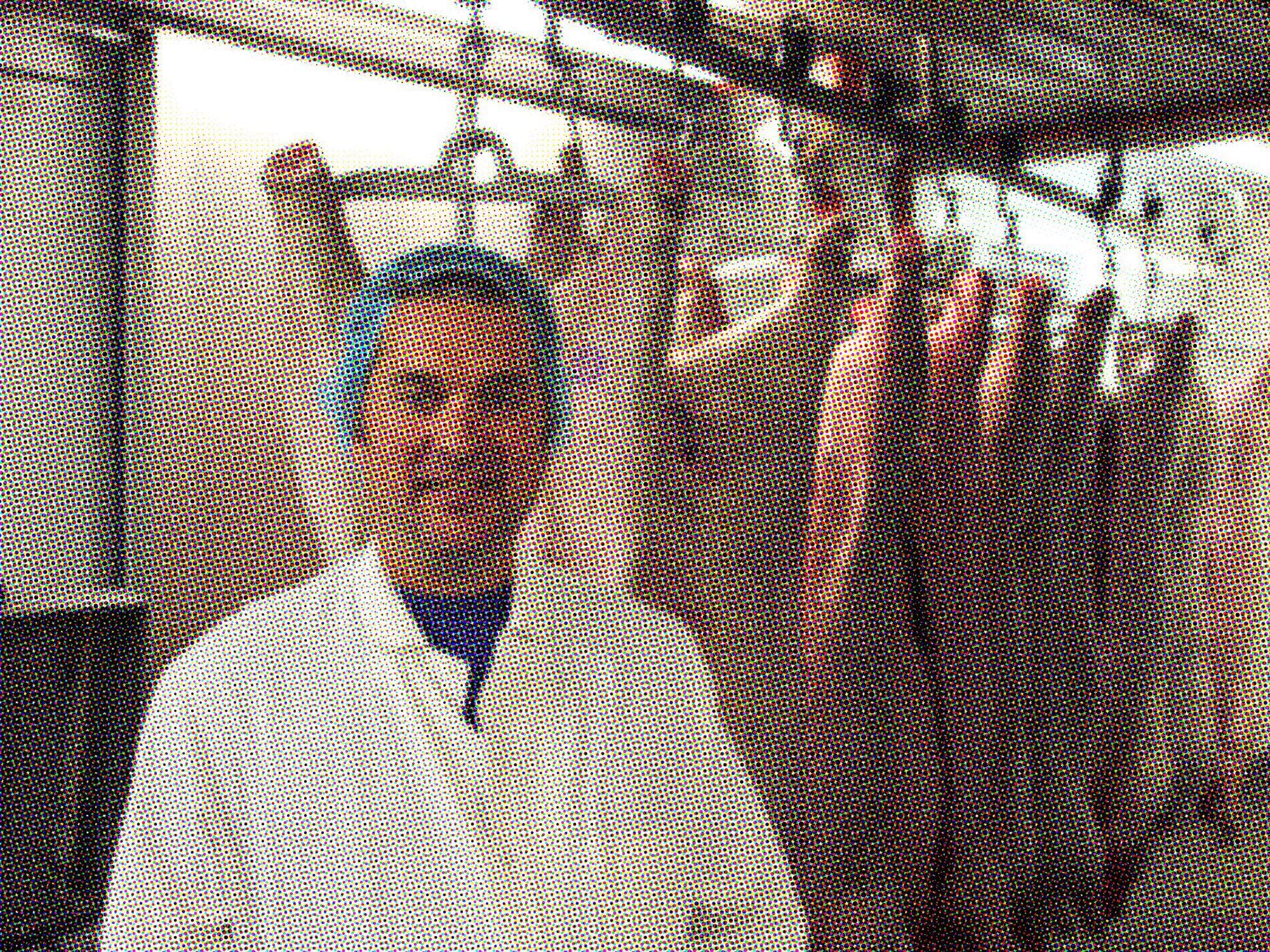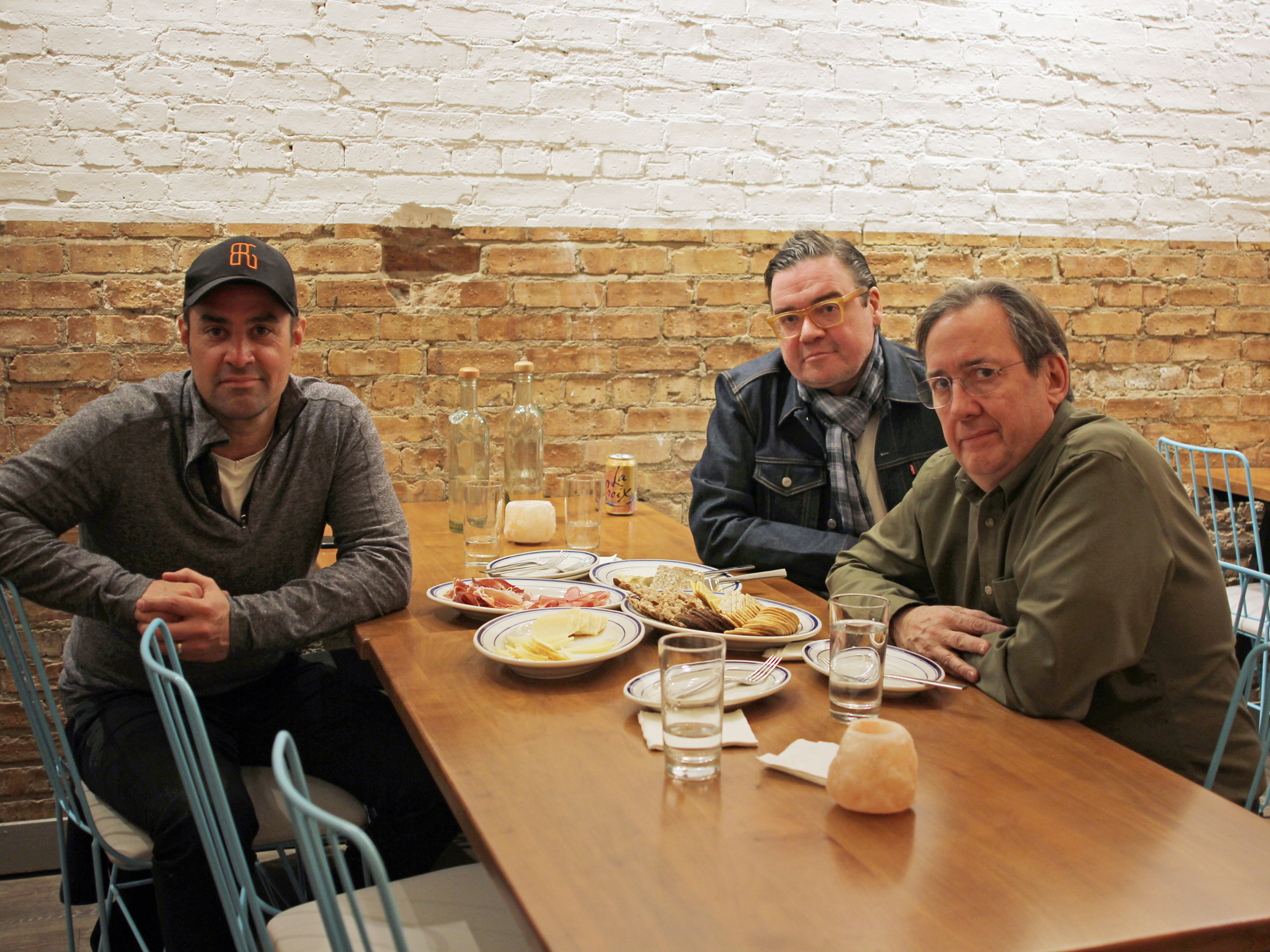I KNEW THAT 2019’S INDUSTRY ROUNDTABLE at Fooditor was going to be different from past editions as soon as Dana Salls Cree walked in the door—and everyone had the same reaction: “Awww, no baby?”
Cree’s daughter Charlie is two months old, and she’d left her with her husband Dan Salls, owner of Quiote, for the next couple of hours. But this roundtable was hoping to meet her, darn it!
The first two times I gathered a couple of business owners of my acquaintance to talk about the state of the restaurant business in Chicago, themes emerged in the conversation—the first one proved to be largely about working life and work/life balance, the second one focused on market conditions, especially real estate. They were also all male—not by anyone’s explicit choice, but just because of how they organized themselves, one person committing and suggesting another. It was time to bring some female voices in, and more, to talk about the industry from the perspective of women, and the concerns that women have, that are not always the same as men’s.
Part of that is the thing that has been much talked about in the last year—#MeToo, which has brought down some big name chefs (though not, perhaps, as permanently as it first appeared it might). But it’s not just that—it’s child care, and self care, and what do you want out of life, and how do you stand up for yourself and your people, and many other things. Things where the perspective of women is worth hearing, too.
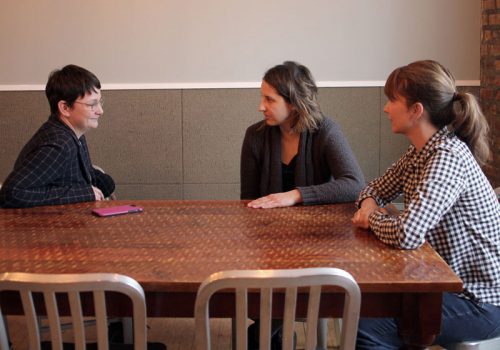
Dana Salls Cree, Christine Cikowski, Sandra Holl
So this year I gathered three experienced women business owners, for a conversation that’s less about forecasting what 2019 might bring, and more about just what life as a woman restaurant owner is like. First was Christine Cikowski, co-owner and chef of Honey Butter Fried Chicken with her business partner Joshua Kulp, who kindly hosted us in the Sunday Dinner Club space (the underground restaurant that Honey Butter grew out of). Next was Sandra Holl of Floriole Cafe and Bakery in Lincoln Park, which grew from a Green City Market weekend bakery into a thriving two-level cafe and maker of excellent French pastries. And finally Dana Salls Cree of Pretty Cool Ice Cream and former pastry chef of Blackbird and The Publican, one of my favorite people to talk with about ice cream or anything else in the cooking and eating biz.
As it happened, babies were much on the mind of Christine, who doesn’t have one but is dealing with her business partner Josh being on paternity leave, among other new babies of staff members. So I didn’t even have to pose an opening question; we went straight into babies and restaurants.
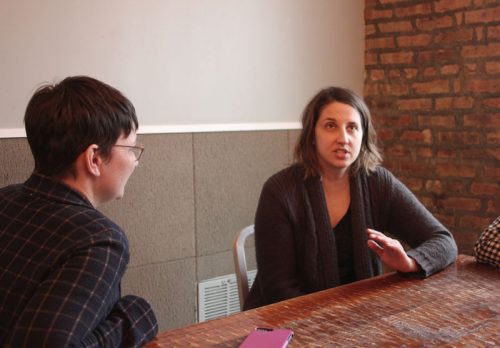
1. Babies and Restaurants
CHRISTINE CIKOWSKI: I don’t have a baby, and even I can barely survive all the babies that come to my business.
DANA SALLS CREE: The ice cream shop is a very different model from a restaurant, and we’re in our slow season, so I can bring her to work, people hold her. The dishwasher loves her.
CIKOWSKI: It’s “it takes a village” shit, man. You need people in your business that don’t have babies, to help with the babies. I’m actually surprised there are no babies here today, there’s usually at least one.
CREE: Jessie Oloroso from Black Dog Gelato said she kept her kids in the ice cream shop until they were nine months.
SANDRA HOLL: Until they were running around?
CREE: Until they were no longer satisfied being there.
CIKOWSKI: And you had your baby, Sandra, I remember because we shared a kitchen and Stella was in her little playpen then.
Josh and I have talked a lot about this a lot lately, since he had a kid—well, his wife Rachel had a kid. She stays at home, she’s a freelance photographer, she can take gigs, though she’s not taking any right now. But there’s no way I could have a child and do this work. It would be a nightmare.
CREE: There’s no resources for it.
CIKOWSKI: Something that we might do, that we’re talking about seriously, is shared daycare. We probably have five kids under one or two, and a couple of other older ones—we have to address it. Now that we do have babies and we pay parental leave. Five people out on three months of paid parental leave is rough.
HOLL: And after that, you need child care.
CIKOWSKI: Right, and right now they’re young babies, so Rachel stays home, brings the baby here when she needs to go out so Josh watches it, we have this office up here, we’re a very flexible environment. Cam and Becca [two of their managers] have opposite schedules, we’re like, make your own schedule, get your job done. But they’re always trading off their baby.
We have to address it, and we’ve talked about, if we did do it, maybe extending it to other people by going in with some other restaurants, and we could just pool, and all pay in and hire a person. If we ever move Sunday Dinner Club out of here, maybe we just say we’re going to have child care up here, and we’re going to pay someone, and everyone pays into it, and we’ll supplement it. We haven’t really looked into it yet, it’s just, what are we going to do with all these babies? Can we provide a stipend, can we partner with a Montessori child care place or somebody in the neighborhood.
CREE: A nanny share.
[A phone rings.]
HOLL: Sorry, this is Stella’s school calling me. [She steps out.]
FOODITOR: And there’s the theme of our conversation, balancing work and family, in action right there.
CIKOWSKI: There it is. Dana, you opened a restaurant while you were pregnant, which is impressive.
CREE: Well, it’s a lot easier than working the line, I can tell you that. When they say it’s one of the hardest things you’ll ever do, I thought, well, I’m used to this incredible amount of labor, sixty hours of hard labor, incredible stress. That doesn’t exist, so you’re more relaxed and you’re more flexible with where you’re at and meeting with people. But the minutiae that you have to have conversations about every detail, over and over and over again, and do we really have to have another conversation about the toilet handles, I’m really going to lose my mind. Somebody make this decision.
Guests don’t realize, when you walk into a space, even in the most underdone restaurant, everything you lay your eyes on was a decision. From the obvious like plates and forks and napkins, to the really un-obvious, like how tall are your baseboards going to be. Are we going to sand down the counters in a round shape, or a square shape—
CIKOWSKI: Ooh, I’m starting to have anxiety. I’m having PTSD from five years ago.
I found that the hardest part was not opening the restaurant—it was keeping it open. The hard part for me was three months after it opened and thinking, oh shit, I have a restaurant that I have to work at every day, seemingly for the rest of my life. Everybody loved us, these were good problems to have, but we still couldn’t keep up with it. We still can’t keep up with it.
And then your first round of staff leaves, and you always have to replace people, and you always have to be hiring, and you always have to be training. And then, oh, things start to break. I am not a parent, so I’m happy to be put in my place, but I feel like it is sort of like raising a kid. They’re small, and they need you right in the beginning to be there all the time, and then they start growing up—the restaurant starts growing up—but it still needs you, in different ways, and it just never stops.
HOLL: I’ll say this, that as a child gets older, they get much more independent than a restaurant does.
CIKOWSKI: I think we’ve just gotten very good at hiring better babysitters. Josh and I made this pretty clear declaration to ourselves that we were not going to have a restaurant be dependent on us.
HOLL: No, you have to manage yourself out.
CIKOWSKI: Like, we were super-inspired by Doug Sohn and how he built Hot Doug’s as this restaurant that was so loved, and had great customer service, great product for 14 years. But I’m not working the counter, I don’t want the business to be based on my personality. But then you have to hire all these people to help you—
HOLL: And you have to articulate what that means so they understand it.
CIKOWSKI: You have to manage them. So if you ask me, what’s the hardest thing about running a restaurant? HR. Every day, somebody has a problem with somebody else, or they need something, or they’re not here, and it becomes this person management—I sometimes wish I could go back to line cooking, because then I could just cook. And now having all these people who need help because they have families has been a huge thing that we were not expecting.
CREE: I look at it as, when you first step into the kitchen, it’s, How do I make perfect product? And when you get good at that it becomes, How do I make perfect product with somebody else? And when you get really good at that, it becomes, How do I make perfect product without ever touching it, by managing the people? And then it becomes, How do I make perfect product without ever touching the cooks, by managing the managers?
And now, as the business owner, that’s sort of where I’m at—how do I make perfect ice cream without touching, feeling, seeing it every day? Without scheduling the cooks. Without purchasing the food.
CIKOWSKI: How do you make perfect product without being there? That’s hard. I haven’t figured it out yet.
CREE: It’s systems, it’s procedures, and the perception could be, oh you don’t do any work. When it’s actually much harder—it would actually be much easier for me to just step in and make it all perfect every time.
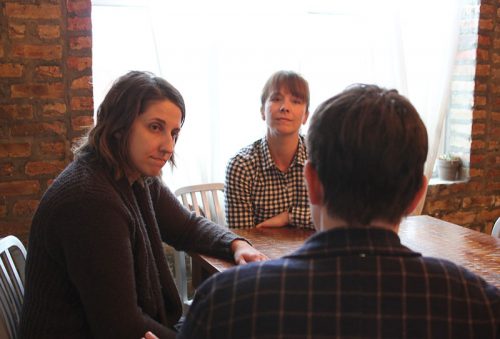
2. What Do You Do Here?
CIKOWSKI: Can we pull the veil off for every cook, runner, server, bartender, whatever, and say, listen, just because you can’t see it, assume that I’m working more than you? Assume that maybe we’re working the same amount of hours, but we do different things?
HOLL: You’re working every day!
CIKOWSKI: I think we have this mentality of, the grass is always greener for the bosses. We have open book management at Honey Butter, we share all the numbers. The only numbers we don’t share are actual personal salaries. On our P&L, every employee can see how much money we brought in, how much money we spent, how much profit we have and what we did with it. To distribution—we have gain-sharing here, and you can see how much money we’re setting aside for profit-sharing, and this is how much everyone’s getting. Whatever’s left, this percentage goes to debt, this percentage goes back into the business, this percentage goes to the partners, which are me and Josh.
They actually can see it all—and still, it’s hard. It’s still like, well, I’m working so hard and you’re getting paid more money. And my thought of it is I should say, yes, that’s true, but I deserve it. I’m not saying I work harder than you, but I’ve been doing it longer and the burden of running a business is on me. I mean, we’re also $430,000 in debt from our opening and our buyout of our partners.
So one of the things we’re trying to do is be really transparent about that, and really teach financial literacy. I would love to pay people $20 an hour—and we might, someday. But if we did it now, we would go out of business. We would never pay off our debt, we would never put in a vestibule downstairs or invest in other peoples’ businesses or, quite frankly, pay ourselves. I tell people, when we just had Sunday Dinner Club, Josh and I made $14,000 a year—for eight years. We were scrappin’ by building up this business for eight years before we opened Honey Butter.
I want to say to them, I hear ya—but you go do that for eight years and then open your restaurant and then we can talk about you getting more money. Or we try to show them, we could give you $20 an hour, but then we can’t give you health benefits, we can’t give you profit sharing, we can’t give you paid time off.
If we raise our prices a dollar and say, we’re giving them health benefits and better pay, customers have a problem with that.
CREE: So when they sit down and look at the entire number, does it make more sense to them?
CIKOWSKI: It helps, but it’s a constant struggle—it’s just in the nature of, you’re living paycheck to paycheck, that life is super hard, and I understand. And we’re working to change that. Like, we support the minimum wage increase, but we’ve run the numbers on $15 an hour, and if we did it now, we would literally go into the red. But if everyone has to pay $15 an hour, across the board in the city of Chicago… then everyone raises their prices, and then we don’t have this complaint of, why are Honey Butter’s prices so high. That’s why we support legislation—everybody should have to pay. Everyone should have to do sick pay. And if everyone has to do it, all the prices go up, and then there’s no, well, I can get this cheaper somewhere else.
Honestly, I’ll admit that even though I know what all goes into your chicken, there’s a part of me that always walks out thinking, damn, that’s kind of a lot for fried chicken. Because the industrial food system has trained me to think the price should be a certain amount.
CIKOWSKI: We’ve had reviews that say, you sell fried chicken, you should price it accordingly. Which is to say, that fried chicken should be cheap.
Or that KFC and Popeye’s get to set the standard for everybody.
CREE: Try selling five dollar popsicles!
CIKOWSKI: Well, and we have an $8 sandwich, which is a little expensive but it’s fairly priced, and the vast majority of our customers are fine with it. We don’t get a ton of complaints, but we do get a few online—”Great food, great service, ripping us off.” Our culture is just not there, as a country—we still want food to be cheap.
We’re being transparent with our customers. We don’t have tipping—everything is priced to, this is what it has to be to take care of our business. But I could lower it by a dollar and put in a tip line, and you’d give it to me anyway. People don’t calculate that into their perception of a price. You’re subsidizing your servers’ wages, and we don’t seem to have a problem with that. But if we raise our prices a dollar and say, we’re giving them health benefits and better pay, they have a problem with that.
There’s a fair amount of education that still needs to go on, and it’s hard, man, it’s really hard. I think what Josh and I bring to the table is that we’re just going to do it anyway, and we’re just going to deal with the fact that it’s hard.
CREE: Something that just hit me like a ton of bricks as soon as I started coming up with finalized wages—not idealized wages, or what if we could pay this. We work side by side with these people, we invest in these people, we love these people, most of them—there’s nobody who wants them to have a better life than we do, the employer. But all of a sudden I realized how insanely unfair it is that everything they need for their life is put on us. It’s put on our wages, and that’s too much.
CIKOWSKI: That’s too much pressure.
CREE: Because ultimately what that means is that everything that they need for their life, the consumer has to pay for that. Those five dollar popsicles have to pay for everything every employee needs for their life.
CIKOWSKI: I don’t think the consumer understands that. They just see the price tag, and they’re like, I want a cheap popsicle. Or a cheap fried chicken sandwich, and I don’t care. Or I think they care, but not to the extent of wanting to pay more money. That’s why I think it has to be across the board. If everybody makes that money, then everything goes up and the consumer has to adjust.
HOLL: I was having a conversation with my dad, eating at Culver’s in Rockford, Illinois and having a fried chicken sandwich—
CIKOWSKI: Lovely. I actually hear their fried chicken sandwiches are pretty good—
HOLL: It was pretty good, I have to say. But it’s really interesting in Rockford, Illinois, sitting with my dad, talking about how much we pay people, front of the house versus back of the house. And he says, Oh, I always give a good tip. And I said, but Dad, that doesn’t touch the people in these restaurants in the back. And he said, Yeah, but all those people who work in kitchens—that’s an entry level job.
And I just looked at him like, what are you talking about? Maybe it’s entry level or maybe it’s not—
CREE: It takes so much skill to be a baker—
HOLL: I know! I’m like, helloooo, Dad? The people that I’m hiring to bake, these are trained people. Or we put a lot into training them. But there’s just a perception that people working in food service, they’re not valued, I think overall.
CREE: Show him all of your cooks’ student loans for culinary school.
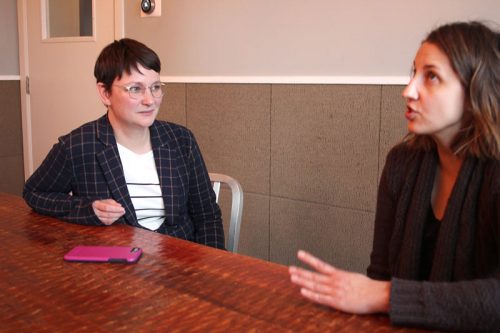
3. The Price of Chicken and the Value of Cooking
So that’s where wages are, but how does that fit in to the total picture of the restaurant?
CIKOWSKI: Our labor is 40, 41, 42%—that’s high. The only way we get it is by having super-low food costs—and I don’t know about you guys, but all of our food costs went up last year. We used to hold at 20, 21%, and it’s been 24, 25% every week. So now we have to renegotiate with our vendors and do competitive pricing, because we don’t want to do another price increase and put it on the consumer. Did all of your prices go up?
HOLL: For sure. Just butter alone, and it’s volatile, too, it’ll go up and then it’ll come back down, and then go up again.
CIKOWSKI: They raised our chicken prices by like two cents, and then you look at the end of the year and it was like $200,000. Oh, there went our profits. Because they raised our chicken prices and we didn’t raise our prices. We just took the cut. We’re doing well, but your profit in the fast casual realm, 15-20% is what you want and maybe it was… 8% last year? I’m not complaining, but there’s nowhere for anybody to go [up in pay] until we have another restaurant.
Let me ask you something. If your future is in the Honey Butter concept, why do you still do Sunday Dinner Club?
CIKOWSKI: Uh… I think my soul would die if I didn’t.
It’s a good question, I have some pretty anecdotal answers to it. It’s a creative outlet for me and Josh, it gives a connection to the community that’s been with us for 14 years, our menus change and we can use seasonal ingredients. I think the reason Honey Butter was such a successful opening was because we had served it at Sunday Dinner Club for many years. We had built this community of people that all showed up when we opened Honey Butter. So it becomes a testing ground, and we launched TriBecca’s Cubano out of Sunday Dinner Club, Becca was our sous chef for five years, and it got a little bit of a following. So I think it’s a good incubator for other ideas. And honestly, it keeps us in touch as chefs, because I don’t cook at Honey Butter very much.
It can be a burden sometimes, because it doesn’t make any money. It employs a really great sous chef and it puts some beautiful food into the world, but it’s not the Daisy Cutter—it doesn’t keep the lights on. But we have to have a little diversity—we can’t just do Honey Butter. I mean, we love Honey Butter, it’s a great product, people love it, it allows a lot of peoples’ dreams to come true—especially me and Josh. Josh just had a baby, he wants to have a house and provide for his family. He wants stability, and we need that financial income. But we also still are chefs, and we want to be creative.
CREE: One of the things I talk a lot with my husband Dan about, who owns Quiote and had another business which he closed called The Garage, which was sort of this food truck commissary where a lot of people who have since opened brick and mortar restaurants got their feet wet.
CIKOWSKI: We did a popup there, when we were opening Honey Butter.
CREE: Right. The Garage closed, after three years. Their lease was up, the landlord gave it to Hannah’s Bretzel. So the question is, did he fail? If you go by Eater’s Shutter Report, sure. But the question is, what is the measure of success for a restaurant? The business doesn’t exist any more, but if you look at it as, every restaurant has a lifespan, and what grew within that lifespan—Dan opened up that space as a pop-up for anybody who wanted to. And he helped create all these little sparks that we’ve watched grow on the Chicago culinary scene. And he made a network of friendships that understand him as a generous, bend-over-backwards kind of guy.
CIKOWSKI: And I think a lot of that goodwill went into Quiote. That’s why people showed up when it opened.
CREE: It comes back to, why did we get into this business? We have an entrepreneurial spirit, but we became entrepreneurs because we wanted a place to practice our craft and to share our craft with the world. So what’s the measure of success? That you can record an extra two points on your profit margin, or that you get to cook ten creative dinners a month?
CIKOWSKI: I think Josh and I have kind of come to a crossroads on Sunday Dinner Club, because the ROI is not financial. And at some point, we can’t just do it because we love it, because our lives have changed. When we started Sunday Dinner Club we were 28, with not much to lose, and I didn’t really care about retirement. Everybody wants their chefs to be like, just doing it for passion. But you can’t just be fueled by passion for the rest of your life.
And the reality of that is, at some point you’re just subsidizing rich people. If I go eat a $200 dinner and there’s ten cooks doing all this mindbogglingly precise work and making no money at it, hey, thanks for keeping the cost of my fancy meal down by giving away your labor.
HOLL: I think that’s something that I think about—where’s the line? How much is enough, and when do I say, I’m making this amount and the people who are working for me are making this much, and that doesn’t feel fair?
CIKOWSKI: But what are you going to do? Could I live on $15 an hour? Yes, because I did for so long. But could I live on that as a restaurant owner, and do that job, that burden that never stops? Because it never stops. There’s no days off. Even if I’m not here, there’s always a possibility of getting a call, an email, somebody wants to have an interview, something breaks. Or they just need you, they hire all these wonderful people to run your business—they have questions, they want guidance. Especially when Josh was out, there was not one day that I wasn’t needed for something. I mean, we’re here talking, and this is great, but I’ve got one ear to the door. I’m waiting.
It’s on us to set boundaries, and that’s something that I’ve been working on. They have to be able to handle it.
HOLL: And most of the time they can handle it, if you back off and let them do their job.
CIKOWSKI: We always say Honey Butter is a safe place to make a mistake, and so we let them make mistakes. They burn things, they have long ticket times, they don’t handle a customer situation quite the way we would—but you just have to let them do it.
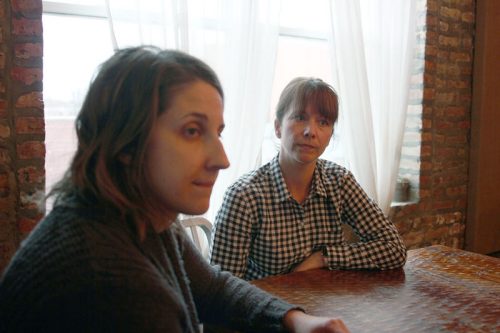
4. Secret Breaks
So in the position you three have, of business owner—don’t you have to find time to step back from the day to day grind once in a while?
CIKOWSKI: I was listening to a podcast with David Chang, and he was talking about how, once you get up to manager, chef, owner, you actually need to work more, or at least have the perception of working more. And when you take time off, it’s seen as a negative, and shameful—have you guys experienced this? I’ve actually been afraid to tell people I’m going on vacation, because I’ve been criticized for it—”Oh, Christine’s going on another vacation.” I don’t even want to tell people I have a day off. I want them to always think I’m working. Even if I take like an hour break. Because “she makes more money than I do.” Do you guys struggle with that?
HOLL: I struggle with guilt. I feel like I’ve had a month or so where I’ve been going in every day, which I’m against 100%—I never want to see my general manager there more than five days in a row. But there’s just been a lot of crap happening, so I’ll work maybe a half day, or I’ll pop in and do something, but I’m still there. And I feel guilty because I don’t feel like I’m putting in a full day’s work, ever, but it never stops. And rationally, I’ll tell myself this is not how I want anyone to work—
CIKOWSKI: Yet I will do it.
Let me ask you something. Do you think men feel the same way?
HOLL: No.
CIKOWSKI: No.
CREE: Yes. Absolutely. First of all, Dan Salls—he’s actually incurred wrath from his employees because he was so afraid to tell them he was going to take two days off. So he just kind of disappeared and then they find out where he’s at.
But like David Posey, when he started to work at Blackbird, he thought he needed to be the first one in the kitchen and the last one out—
He said, You have to last ten years, and you can’t do that for me if you burn out in the first two years.
CIKOWSKI: What is this thing where you’re the owner, and you have to be first one in, last one out—
CREE: Well, Grant [Achatz] taught him that. That’s how he perceived Grant was at Alinea.
CIKOWSKI: I don’t think that’s healthy. You’re setting the example that you have to work longer and harder than everybody. What if we all just worked the same, but did different things?
This is one of the reasons we decided to do paid time off at Honey Butter, because everybody needs a break. Everyone needs a vacation and the best that we can do for them is, we know you’re not making $50,000 a year as a line cook, but if you want to take a week off, we’ll pay you for it.
But I know people who’ve worked at Alinea, and the hours are just… I can’t imagine.
CREE: I say everybody stays at Alinea as long as they can handle it. For some people that’s an hour. For others, it’s two days, or two years.
CIKOWSKI: How do you wear that as a badge of honor, “I worked 50 hours a day…”
CREE: But you do it for six months and it does feel like a badge of honor. I found my physical limits there.
My friend Thomas Raquel, who’s the pastry chef at Le Bernardin, came from L2O where Laurent [Gras] instilled that work-till-you-die mentality. And he went there and was doing the same thing, and Eric [Ripert] pulled him aside and said, you go home. You work five days a week, ten hours a day, and if something isn’t done, have a cook do it.
And he said something that sounds really harsh, but it’s true. He said, “They are a two-year investment. You are a ten-year investment. You have to last ten years, and you can’t do that for me if you burn out in the first two years.” When I was a young cook I wanted to burn myself out.
Don’t you think, though, that when you’re young, you just want to see if you even can work that hard? To see what you’re capable of?
CREE: There was a part of me, when I was young, that wanted nothing more than to work all I could and sponge up everything. I worked at places like The Fat Duck for free—I would work for three years, and save as much as I could, and then go to Europe and blow it all working for three months for free. And that intangible investment in myself is something that I still carry with me.
I’m afraid for the next generation of cooks, because we’re watching these opportunities dry up. Because they’re going to pay for the labor they need, and cut off these openings where they’d bring somebody in, and sure they’re picking herbs or washing dishes, but they’re not really necessary. And yes, it can turn bad and restaurants can exploit this stage network, but I did it at Noma, I did it at WS-50, I did it at Fat Duck, I did it at Modernist Cuisine, and now not a single one of those places will accept an unpaid intern that’s not connected to a school. So now these opportunities are only available to people who are paying tuition, and most of us couldn’t afford those tuitions anyway, so we’ve lost this creative training ground.
CIKOWSKI: I staged at Chez Panisse for free, because I just wanted to see that kitchen, and I knew they wouldn’t hire me.
I worked 14 hour days at Blackbird. But at what cost? I mean, my knees are fucked up now, and now that I’m a chef it sets this precedent of, now I need to do even more. And I still can’t tell people I’m taking time off. I’m leaving on Sunday and taking ten days off, because I’m burnt out after the last few years, and I still can’t tell people that. I can’t tell my cooks, I’m taking several vacations this year, because I’m afraid they’ll say, “Well, I can’t go to Hawaii.”
CREE: Talk to me when you’re 40.
CIKOWSKI: Talk to me when you’re 40, and you own two businesses. But I don’t want to say that to them.
What I’d love to see happen, and maybe it could come out of this, is we all sit down and we say, life is hard, being a human is hard, we all have our different hard, and your hard is that you’re struggling to make ends meet, but you clock in and clock out and that’s it. And mine is that it’s never over, except I get three or four ten day periods a year when I crash. Literally, I’m going to go to my friends’ and sleep for ten days. And that’s not healthy. It needs to be okay to take a fucking break. And we shouldn’t be ashamed of it.
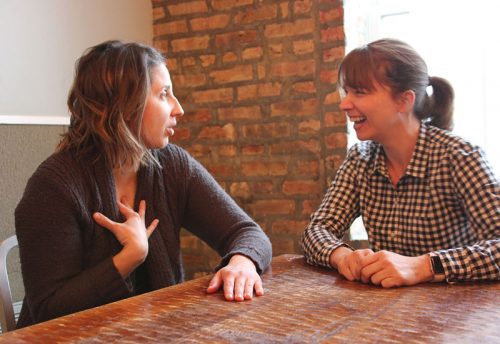
5. Next Year of the Woman
It’s been pretty interesting to hear how the three of you look at the issues any owner, male or female, has to deal with—and I think you’re looking at them differently from how men would in many cases; I don’t think men feel guilty about making more money, for instance. But I feel like we haven’t really gotten to the women-specific questions—
CREE: Yes, we keep tampons in the staff bathroom.
I wasn’t thinking that specific! But the things that the media was talking about all through this past “year of the woman.” How do you feel about a year of #MeToo and some chefs getting sent out to pasture? Do you feel like things are getting better, or was it just window dressing?
HOLL: Well, they’re coming back from pasture.
CREE: Just because it was so vocalized and so widespread [in the media], doesn’t mean it wasn’t still painful. Because for every woman who stands up and says “Me too,” there’s a man who also has to say “Me, too, I hurt somebody.” And the reality is for every woman who says “Me too,” there’s a man who victimized multiple people.
One of the things somebody said to me was, “Well, I’ll play by the new rules, but I don’t think it’s fair to retroactively go back and punish us, because the rules were different then.” No, the rules were never different, there was just no accountability for them. You always knew you weren’t supposed to touch our butts. You always knew you weren’t supposed to corner someone in the walk-in and stick your hand up their blouse. You always knew these things. You always knew that when you squeeze by somebody in tight quarters, you tip your groin backwards, not forwards.
It’s hard, because it kicked up a lot of dust, “everything’s going to change now,” “women’s voices are being heard now.” But at the same time as it settles, you still see all the people who you experienced doing it, accelerating in their careers.
CIKOWSKI: Discrimination is just never something that we’ve tolerated here. We do a lot of training, and kitchen culture—professionalizing it—is just part of that. Being offensive, and discriminatory, and harassing people, is just not something that we tolerate. From day one, we’ve been pretty hard on that—whenever we’ve had to address it, it’s been like “Nope, we’re not like that here.”
We’ve fired people who have said harassing things to me. And I’m the owner, but we just shut it down. Hey, you don’t talk about women that way. “Oh, I wasn’t talking about you.” Yeah, but you can’t talk about anybody that way, it’s not professional. It’s unacceptable, it’s wrong. And then there has to be higher consequences for that.
HOLL It goes even to the little “jokes” that can be said, that are just a little underhanded. No, it’s not gonna happen here, because it perpetuates it.
CREE: I wrote a piece for Food & Wine called “The Writing’s On the Wall.” And having gone through one of Chicago’s only Me Too chef firings, one of the things I heard with the people who made decisions was, “We didn’t see this coming, how didn’t we see this coming.” And simultaneously, “When we look back, we can see that the writing was on the wall.”
And my question was, well, let’s take that literally. If the writing was on the walls, what did it say? And it my experience, it was all of the tiny underhanded jokes about gender, race, sexuality—90% of them are about penises, and all the other words that are used for penises. It was jokes at anybody else’s expense, and they felt funny, and they got picked up as culture. But what I realized was, you watch a new person walk into this environment, and pretty soon it’s part of their vocabulary, and how they treat the people that are the targets of it. And it’s sick.
And I realized that all of these jokes, they feel like jokes, but what they’re really doing is silently grooming the entire staff to look the other way when the joke becomes a reality. I had to pull a cook aside and tell him that you can’t be alone in the bakery with one of my employees, and when she’s getting something on a ladder, go underneath her and tell her you like the view.
CIKOWSKI: Oh God, I’m gonna puke—
CREE: How many times did they say something about her without her present, before they walked under her on a ladder and tell her they liked the view.
CIKOWSKI: I had a fry cook once tell me, “Oh, you caught me checking out your ass.” And he said it in front of everybody. I said, “Let’s go! Nope.” And I pulled him outside, and I said, “You cannot talk to me that way. You cannot look at me that way.” And he was like, Oh my God, I’m so sorry, but afterwards I’m thinking, how many times did you do that before you actually decided to say something, and it just sort of sickened me a little bit.
And I talk to Josh a lot about it, because he doesn’t have this problem. And that’s the difference with women chefs and business owners, we can all talk about wages, and food costs, and the struggles, but my business partner doesn’t get harassed or looked at by his employees. And it’s always been that one thing—
CREE: You’re always on guard. You’re always using ten percent of your brain to scan the room, and brace yourself for some sort of uncomfortable moment. And then when it happens, you’re using that ten percent of your brain to shield it, ignore it, deal with it, talk to somebody about it. And when men don’t experience this, and we’re constantly running at 90%, no wonder they can excel. How much further could we get if we got to put 100% of our brains into our jobs?
CIKOWSKI: We made the decision that if it does happen, Josh would deal with it. Because he obviously does not tolerate it in any capacity, and it seems to have more impact when he deals with it. It’s actually been very effective when he says to a man, we don’t talk to women that way. We need to police it, but we also need our male business partners, and our male chefs and dishwashers and everybody, to stand up and say, Hey man, no, we don’t do that. And I think the more men do that, that’s when we’re going to see the change.
CREE: I also believe that most of the people who come into our kitchens, they didn’t come in wanting to harass women. They came in wanting to cook. And when we go back and set the tone for them, most of them are grateful. They’re like, you know what? You’re right. I would prefer to behave this way. I’m glad to know that boundary is there, because now I can stand behind it too.
One of the shining lights in The Publican scandal was that I made it clear, and for the first time I felt competent to do it, that this shit doesn’t fly. I will say something, I will stand up for you. So my cooks came to me with stuff, and they came to me with stuff about other cooks. And I was able to address HR over bullying, and sexual harassing, and inappropriate touching. And after I left, one of my cooks said to me, “Dana, you would be so proud, we fired somebody!” This cook had been there for a couple of weeks, and he went up to this female line cook and asked her, “So what, are you like The Publican doorknob, everybody gets a turn?”
She didn’t say anything, but a sous chef heard him, and went, this shit doesn’t fly, we just went through this. They immediately got the cook outside, they immediately got the chef and HR, and it was dealt with that day.
HOLL: The culture has completely shifted.
CREE: But this cook was just in shock. He had no clue.
CIKOWSKI: Every single one I’ve had to deal with, look at me like they’re so surprised.
I had a cook tell me he was in love with me once. Literally, he was like struggling on the line, and he says, Christine, can I talk to you, so I pulled him outside, and he says, “I think I’m in love with you.” And I was just, dude, you cannot, you can’t say that to me. I’m your boss, I’m your co-worker, you cannot. And he literally couldn’t see what was wrong with that.
HOLL: Wow.
CIKOWSKI: We say wow, but they don’t see it. Well, I think some of them do. They know they’re fucking with you and they shouldn’t do it. But they’re literally surprised, because it’s just been okay for so long, they’ve grown up in restaurant culture, or a culture where that’s acceptable.
All right, let me ask you something. What if you have two employees and they legitimately want to date? Because we all know the line that restaurant people can only date other restaurant people, because nobody else works those hours.
CIKOWSKI: Well, we’ve had that happen. I think that it only becomes challenging at different management levels. So a manager and a direct report.
CREE: It’s not just challenging, it’s protected by law.
CIKOWSKI: Right. Reality is, we’ve had plenty of employees date, and usually it’s been two cooks, or two runners, and legally it’s fine. Usually it’s not an issue, and everybody kind of knows about it. We’ve definitely had a situation where a manager starts dating somebody who’s a direct report, or not a direct report but at different levels—like a sous chef and a food runner. They’re not in the same department, but it’s still an issue because one of them has authority.
As soon we find out about it, you can’t be their manager, we have somebody else doing their schedule, doing their reviews, and we go to the other person and say, if you have a problem, you don’t have to go to them, this is what you do. Because, you know, we don’t want to say no to love. This isn’t people hooking up after a shift, this is people saying, I’m in a relationship with this person, and we don’t want to stand in the way of that. But we have to protect the business, so we have a sexual relations policy written down.
CREE: The issue isn’t people getting into a relationship—it’s when they’re getting out of one.
CIKOWSKI: Well, yeah. But when you take the management part out of it, it’s just a matter of two employees being professional, and we preach a lot of being professional here anyway. You don’t have to like the person you work with, but you have to treat them with respect.
There’s something that we’ve talked about recently—we’re really good at dealing with our own culture—
HOLL: But not customers.
CIKOWSKI: Right? How do you deal with customers who come in—and again, it doesn’t ever happen to our male employees—where they are standing at the host stand and guys are ogling them, making comments. We’ve always told them that if you don’t feel comfortable, just walk away from a situation and call a manager, and we’ll deal with it. But how do you discipline a customer? It’s to the point where some of our staff members say, we should be able to say we don’t talk to people that way, and ask them to leave. We’ve kicked out a couple of people, where we thought, this is just too much, where they’re being harassing or discriminatory, and asked them to leave. But we haven’t kicked out everybody.
CREE: I think that’s a situation with a lot of restaurants, where the customer is allowed to say and do almost anything they want, and you can’t fight back or you’ll look bad in the press. I have a friend in Houston, Becky Masson, who has Fluff Baker Bar, and two years ago, she was just, I’ve had it. These people who say whatever they want to me on Yelp, they’re clearly not interested in any kind of a relationship with me, why would I hold anything back? I will negate everything you say, I will tell my side of the story. And I won’t feel bad, and I don’t care if you call me a bitch. I’m not going to protect you any more, and I’m not going to guard some reputation of mine, just to stay silent.
So when are we allowed to push back on abusive reviews? When are we allowed to push back on abusive guests? When does the idea that the customer is always right get thrown out the window, and you need to behave respectably, and if you’re going to tear me down, I’m going to stand back up for myself? Without the rest of the public saying, you sit down and take it, because that’s your role.
CIKOWSKI: I haven’t read Honey Butter’s Yelp reviews in probably two years. I think somebody probably reads them. I think Josh reads them.
CREE: I read Yelp reviews and I find them fascinating.
[LAUGHTER]
After spending time at The Fat Duck, I realized that human perception of what we make, and the memory it creates, is the reality. I can make 20 coffee pretzel toffee bars, and give them to 20 different people, and they become 20 different experiences. So I’m fascinated to see how everything that I have added up… what it lives on as in memory. That fascinates me. It’s almost like aliens are watching me.

6. Models For a New World
Okay, we’ve talked about the really obvious and gross forms of sexism. But those are at least easy to recognize and police. I think the subtler kinds can be harder to root out. One thing that interests me, Christine, is that you’re the rare example of a woman who is partnered with a man in a business, and you’re not a couple. (I realize that Dana also has a male business partner, but you are Pretty Cool, while Josh and Christine together are Honey Butter.)
CIKOWSKI: I think a lot of people think Josh and I are married—which is probably the reason I’m still single, not because I’m not awesome. Josh and I have great chemistry, we cook well together, we butt heads a little but we run our business very well together. But just because I’m a woman and he’s a man, the perception is that we must be a couple, and to further that perception, that he’s in charge and I’m helping him. Or he’s the chef and I’m the pastry chef, which a lot of people still think.
We’ve had our fair share of experiences where we’ll meet people, especially investors, and they’ll talk to Josh. I had one situation where they actually stood in front of me and talked to Josh. What they didn’t understand was, and Josh would probably roll his eyes at this, but I’m the person that you’ve got to convince. I’m the “No” person in our business.
And they just failed that test.
CIKOWSKI: They failed the test. It really rubbed me the wrong way, and I talked to Josh about it afterwards, and he said, I didn’t really realize that, we were already having a conversation. And I said, okay, but that person met me, and you said I’m your business partner and they shook my hand, and then they turned around in front of me and continued to talk to you. And I don’t even think that they knew that they were doing it, but definitely, there are a lot of people that believe that Josh is the chef, and I’m… his wife.
HOLL: That even happens to me, with Mathieu [Holl, her husband and co-owner]. He’s a man and he speaks French, so he must be in charge.
CREE: It happens with Michael [Ciapciak of Bang Bang Pie & Biscuits, her partner in Pretty Cool] and me, too—people assume that I’m Michael’s wife, and that he owns Pretty Cool.
This came up with the first articles about Pretty Cool—Louisa Chu published the announcement that I was leaving The Publican to start Pretty Cool, and then Eater did the followup article, and took “Dana Cree opens ice cream shop with Michael Ciapciak” and turned it into “Bang Bang opens ice cream shop, oh by the way they hired Dana as the talent.” I read it and first, my ego was like, “What the fuck? I did this!” But then I realized, oh my God, this is gender bias, because they read an article where a man and a woman are described as the owners of a business, and they assumed that the male was the lead. And they made that assumption so hard that they only reached out for comment to Michael.
A year ago, without listening to what everybody was saying and reading it, I would never have gotten past bruised ego to be able to say, gender bias completely shifted the narrative of my business.
That said, I will say that the one place I have seen an immense amount of change, is in the press. The press is at least asking, if I’m going to feature a chef in this article, is it a man or a woman. And before I don’t think they even considered it, they just picked somebody and it just perpetuated men, men, men, men—well, I read about this guy so I’ll write about this guy. Or, they’re going to do an event, I picked three, do you have a buddy. And now people who are putting on events are at least asking, well, do we have a girl? Should we think of a girl?
The trickle down to the trenches is slow, and sometimes I fear that it has halted. But when I went to the James Beard Awards last year, I saw for the first time an incredible gender and racial diversity in the award winners. And I wondered—well, I didn’t wonder, it was immediately said that they only won because they’re black, and they wanted to look diverse.
But the reality is, how did they end up on that list in the first place? It wasn’t that they only got an award because they were a woman and they wanted women winners—it was because years ago, people started asking, who’s making the food, who else is making the food, let me go try that too, and the spotlight went places it hadn’t gone before and found quality that had slipped through the cracks before.
I used to think I only wanted press I earned. But the reality is, there’s so many people who are worthy of press, and press isn’t a reward. It’s a spotlight, and there are a lot of people who can fit in that spotlight.
HOLL: I think you bring up a good point about how, as women, we’re learning to question the way we’ve been raised and the way we see the world.
CREE: It’s pretty recent that it was legal to discriminate on the basis of sex. That’s kind of the shock for me, how much I never questioned it—
HOLL: And contributed, unknowingly.
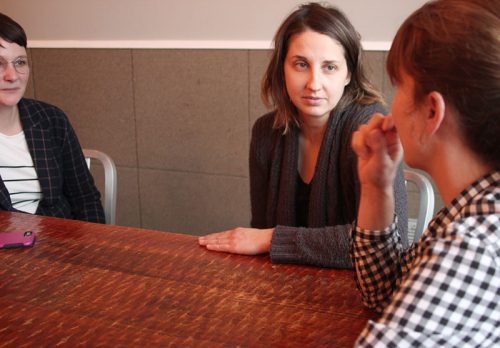
CREE: How much I played along with my gender role.
When I was funding the business, I was pregnant. And I was terrified to let potential investors know that I was pregnant, because I was afraid that they would see me as an unsafe investment because I was going to start a family, as somebody who wouldn’t be able to put in all of the hours. Or would have to take a call from their children’s elementary school. Where with a man, it would never come up. Oh, your wife’s pregnant? Congratulations. Even if they said yes, they would still question me, so I just didn’t bring it up.
And I still feel bad—like, do I tell potential clients oh, I’m on maternity leave? That I can answer all these questions, but I’m not back in the shop. Or do I create the veil that I’m working right now and not let them know that I’m actually in this vulnerable position? Because one doesn’t do anything to advance the cause, if I have to hide that I’m at home taking care of a child during the first three months of its life, and recovering from pregnancy myself.
This is not unskilled labor, these are working professionals, and we’re trying to professionalize our industry by treating creating an environment that respects everyone who works in it.
HOLL: This is a huge problem, I think, in kitchens. There are not a lot of women who stay in kitchens, because it doesn’t make sense for them to continue in the industry because there’s quote-unquote, not a place for them. And if you do stay, what do you do with your kids because you probably are going to pay more in child care than you’re making.
CREE: I’m going to be okay—I own a business, I draw a living salary, I have a husband and he has a mother—our child’s going to be taken care of. But somebody who’s a sous chef may not have that option. What about my dishwasher, what about my lower level employees, where they could literally make more money being my nanny than working for me at the shop?
So to wrap up, what do you do in your own businesses to model the way the world should be?
CREE: Well, I think you have to pick and choose which cause you’re for. And right now, the cause we’re fighting for is creating a very safe work environment, emotionally, for people. So, gender neutral bathrooms. We have an employee who is transitioning, so we offered a lot of support for them. Sometimes they’d change medications and be sick, so we’d cover for them. Just making sure that people understood which pronouns to use, checking with them first on how they wanted us to approach the staff about it, if they wanted us to.
Those kinds of things are so important to me, about creating an inclusive environment. The mantra that we’re building the business on is inclusivity, and what that means for us is creating a product that all demographics enjoy. We’ve talked about this with nostalgia, whose nostalgia are we selling? I love nostalgia for a lot of reasons that would take a lot of time to explain, but if I tap into the bucolic, turn of the century ice cream shop, who remembers that, who does that tickle? It’s probably not the Latino community that has moved up in the last eighty years, it’s probably not immigrant communities that have come since.
So we really looked at the ice cream truck that rolled around in urban areas in multiple cultures—in China, in India, in Mexico, ice cream on a stick is the way that everybody eats ice cream. South America is where we get our machinery, because that’s where they make most of them. So it allows us to include everybody in a way that’s not the case with the vision of the bucolic, Americana ice cream shop, s-h-o-p-p-e. How do you want to better the world, that’s the pillar we stand on, yours may be different—
CIKOWSKI: Yeah, I’m a white person from the suburbs of Chicago who owns a fried chicken restaurant [laughs]. I think we are pretty sensitive to that, I think we can kind of make our way in it because fried chicken is part of every culture. It’s not something that is unique to any one culture or region, even if in this country, it’s very much a part of Southern culture. We are very sensitive to, and celebratory of, the fact that every culture has its fried chicken and this is how we, as chefs from the midwest, express our fried chicken. But we’re not from the south, we’re not trying to do a southern fried chicken restaurant—we take the bones out of our breasts and thighs, which has been… controversial.
In terms of how we try to model a better world—I think ours is really about taking care of our employees, and having as many of the resources that basic humans being should have—basic health care, time off, sick pay. And then just being treated in a way that is professional. This is not unskilled labor, these are working professionals, and we’re trying to professionalize our industry by creating an environment that respects everyone who works in it. And trying to share that knowledge with our colleagues and our peers.
HOLL: I think the model that we look at is, where are we sustainable. Yes, we do all the food things. But it really does matter being sustainable with the people that work with us, too. We want to make sure that they are working hours that make sense, that they’re being paid well, though I wish we could pay them better.
I think people come into Floriole from certain other kitchens and there’s a different feeling. I’ve been told it’s a “woman-owned business” feeling, and I don’t know, because I’ve only ever worked for women. I worked at Tartine, and then I came here. So, one other kitchen. But there’s no question about the way that we communicate at Floriole—there’s no real yelling, there’s a lot of respect for each other, there’s no music with explicit lyrics, no innuendo, no jokes. I can think of one person in our kitchen who was let go because he was being a machismo kind of guy, and he could not control himself.
Since then, I’ve had people who have left our bakery and gone and worked other places, and they’re now known as “the HR guy,” because they know that that’s not how you behave in a kitchen. We’re all humans, we all treat each other like humans. I think one of the most important things we do as women chefs and business owners is around mentorship. I am the biggest champion for the people who have worked with us at Floriole, and nothing makes me happier than watching them move on and find their own success. I like to think that we model a humane kitchen environment that is demanding, yet nurturing.
Michael Gebert is editorperson of Fooditor.
Latest
Join the Discussion
After you comment, click Post. If you're not already logged in you will be asked to log in or register with Disqus.




